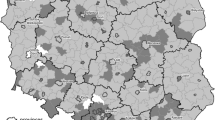Abstract
I consider the decision of a parliament that might change the electoral system from the plurality rule to proportional representation for forthcoming elections. Parties are office-motivated. They care about winning and about the share of seats obtained. I examine two different scenarios of how parties in government share the spoils of office: equally or proportionally to their share of seats. If the government is formed by a single party and parties expect that each party will obtain the same share of votes in the next election, the electoral rule will never be changed. Therefore, for a change to occur, the government should be formed by a coalition. I find that a change is more likely to occur when there is a larger number of parties and also when the spoils of office are shared equally among the members in the governing coalition. These results are extended to analyze the decision to change from a less proportional rule to a more proportional one.
Similar content being viewed by others
References
Acemoglu D, Robinson JA (2000) Why did the west extend the franchise? Democracy, inequality, and growth in historical perspective. Q J Econ 115: 1167–1199
Banzhaf JF (1965) Weighted voting doesn’t work: a mathematical analysis. Rutgers Law Rev 19: 317–343
Benoit K (2004) Models of electoral system change. Elect Stud 23: 363–389
Blais A, Massicotte L (2002) Electoral systems. In: LeDuc L, Niemi R, Norris P (eds) Comparing democracies 2. Sage Publications, London
Bogdanor, V (eds) (1991) The blackwell encyclopedia of political science. Blackwell Ltd, Oxford
Boix C (1999) Setting the rules of the game: the choice of electoral systems in advanced democracies. Am Polit Sci Rev 93: 609–624
Colomer J (2005) It’s parties that choose electoral systems (or, Duverger’s laws upside down). Polit Stud 53: 1–21
Gallagher, M, Mitchell, P (eds) (2005) The politics of electoral systems. Oxford University Press, Oxford
Laakso M (1979) Should a two-and-a-half law replace the cube law in British elections?. Br J Polit Sci 9: 355–362
Laakso M, Taagapera R (1979) Effective number of parties: a measure with application to West Europe. Comp Polit Stud 12: 3–27
Leiserson M (1966) Coalitions in politics. Yale University, Ph.D. thesis
Lijphart A (1992) Democratization and constitutional choice in Czecho-Slovakia, Hungary and Poland 1989–1991. J Theor Polit 4: 207–223
Lijphart A (1999) Patterns of democracy: government forms and performance in thirty-six countries. Yale University Press, New Haven
Maloney J, Bernard P, Pickering A (2003) Behind the cube rule: implications of, and evidence against fractal electoral geography. Environ Plan A 35: 1405–1414
Qualter TH (1968) Seats and votes: an application of the cube law to the Canadian electoral system. Can J Polit Sci 1: 336–344
Riker W (1962) The theory of political coalitions. Yale University Press, New Haven
Shapley L (1953) A value for n-person games. In: Kuhn H, Tucker AW (eds) Contributions to the theory of games. Princeton University Press, New Jersey
Taagepera R, Shugart MS (1989) Seats & votes. Yale University Press, New Haven
Tsebelis G (1990) Nested games: rational choice in comparative politics. University of California Press, California
von Neumann J, Morgenstern O (1953) Theory of games and economic behavior. Princeton University Press, Princeton
Author information
Authors and Affiliations
Corresponding author
Additional information
I am grateful for the help and valuable comments of Enriqueta Aragones. I would also like to thank Carmen Bevia, Oriol Carbonell and Jordi Massó and an anonymous referee for their helpful comments. Financial support from MEC (SEJ2007-62081/ECON) and Junta de Andalucía (P07-SEJ-02547) is gratefully acknowleged.
Rights and permissions
About this article
Cite this article
Ergun, S.J. From plurality rule to proportional representation. Econ Gov 11, 373–408 (2010). https://doi.org/10.1007/s10101-010-0081-z
Received:
Accepted:
Published:
Issue Date:
DOI: https://doi.org/10.1007/s10101-010-0081-z




